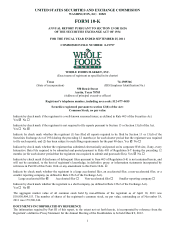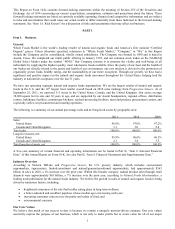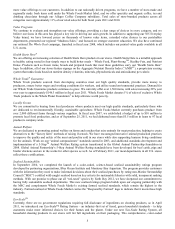Whole Foods 2011 Annual Report Download - page 17
Download and view the complete annual report
Please find page 17 of the 2011 Whole Foods annual report below. You can navigate through the pages in the report by either clicking on the pages listed below, or by using the keyword search tool below to find specific information within the annual report. 11
selling handicrafts, homemade and bakery-made foods, clothing and footwear. It is estimated that each woman supports a
family of almost six, which means our support is contributing to the prosperity of nearly one million individuals.
Whole Kids FoundationTM
In July 2011, we launched the Whole Kids Foundation (www.wholekidsfoundation.org), a non-profit organization dedicated
to improving children’ s nutrition through partnerships with schools, educators and other organizations. The foundation’ s first
major initiative is the Whole Kids School Garden Grant Project, a program that will enable schools to help build children’ s
relationships with food through the power of gardening. Our customers clearly support this initiative, recently donating more
than $2 million during a six-week campaign, with Whole Foods Market donating an additional $0.2 million, to fund more
than 1,000 school gardens. Whole Foods Market covers all operating costs and the overhead budget for the foundation. Other
areas of focus are the foundation’ s partnership with The Lunch Box Project (in 2009, Whole Foods Market and shoppers
donated more than $0.7 million to fund this online resource for public schools created by Chef Ann Cooper’ s F3 Foundation)
and with Let’ s Move Salad Bars to Schools as a founding member (in 2010, Whole Foods Market shoppers donated more
than $1.4 million during a seven-week campaign to help fund 570 salad bars in schools across the country). Let’ s Move
Salad Bars to Schools has now funded 1,000 salad bars for schools. By 2013, the group hopes to have placed 6,000 salad
bars in schools, and Whole Foods Market has pledged $1 million towards that effort.
Green Mission®
We are committed to supporting wise environmental practices and being a leader in environmental stewardship. Over the
years, we have purchased over 4.3 billion megawatt hours of wind-based renewable energy, earning six Environmental
Protection Agency (“EPA”) Green Power awards from 2004 through 2010. We have 14 stores and one distribution center
using or hosting rooftop solar systems, four stores with fuel cells, and a commissary kitchen that is using biofuel from
internally generated waste cooking oil. We have made a commitment to reduce energy consumption at all of our stores by
25% per square foot by 2015, and we build our new stores with the environment in mind, using green building innovations
whenever possible. Twelve of our stores have received Leadership in Energy and Environmental Design (“LEED”)
certification by the U.S. Green Building Council, and four stores have earned Green Globes certification from the Green
Building Initiative.
We discontinued the use of disposable plastic grocery bags at the checkouts in all stores in 2008 and refund at least a nickel
per reusable bag at the checkout. We also were the first national retailer to provide Forest Stewardship Council (“FSC”)
certified paper bags originating from 100% post-consumer recycled fiber. Nearly all of our stores are involved in a recycling
program, and most participate in a composting program where food waste and compostable paper goods are regenerated into
compost. Additionally, in 2007 we introduced fiber packaging in many of our prepared foods departments that is a
compostable alternative to traditional petroleum and wood- or tree-based materials. We also are working to eliminate the use
of Styrofoam in packing materials shipped to our Company and in product packaging in our stores.
Government and Public Affairs
Our stores are subject to various local, state, federal and international laws, regulations and administrative practices affecting
our business. We must comply with provisions regulating health and sanitation standards, food labeling, equal employment,
minimum wages, licensing for the sale of food, and in many stores, licensing for beer and wine or other alcoholic beverages.
The manufacturing, processing, formulating, packaging, labeling and advertising of products are subject to regulation by
various federal agencies including the Food and Drug Administration (“FDA”), the Federal Trade Commission (“FTC”), the
Consumer Product Safety Commission (“CPSC”), the USDA and the EPA. The composition and labeling of nutritional
supplements are most actively regulated by the FDA under the provisions of the Federal Food, Drug and Cosmetic Act
(“FFDC Act”). The FFDC Act has been revised in recent years with respect to dietary supplements by the Nutrition Labeling
and Education Act and by the Dietary Supplement Health and Education Act. We believe we are in compliance with all
product labeling requirements material to the Company.
Trademarks
Trademarks owned by the Company or its subsidiaries include, but are not limited to: “Whole Foods Market,” “365
Everyday Value,” “AFA,” “Allegro Coffee Company,” “America’ s Healthiest Grocery Store,” “ANDI,” “Bread & Circus,”
“Capers Community Market,” “Eco-Scale,” “Fresh & Wild,” “Fresh Fields,” “Green Mission,” “Harry’ s Farmers Market,”
“Health Starts Here,” “Ideal Market,” “Merchant of Vino,” “Mrs. Gooch’ s,” “Vine Buys,” “Wellspring,” “Whole Baby,”
“The Whole Deal,” “Whole Foods, Whole People, Whole Planet,” “Whole Kids,” “Whole Kids Foundation,” “Whole Kids
Organic,” “Whole Planet Foundation,” and “Whole Trade.” The Company or its subsidiaries also holds registrations or
applications, and maintains common law trademark rights for stylized logos and brand names for products created by Allegro
Coffee Company and many of its branded products. In addition, the Company licenses certain trademarks, including
“PLANT-STRONG,” a trademark owned by Engine 2 for Life, LLC. The Company considers certain of its trademarks to be
























